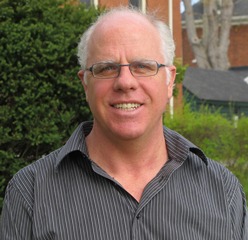South African student seeks change in country's food system
May 10, 2013
Share
 Queen's in the World
Queen's in the WorldAfter 15 years working in the South African tourism and hospitality industry, Gareth Haysom transitioned into academia because he saw things that needed to change within the country’s food system.
“I saw some really challenging points, and realized how I was a player in the problem and how we were being supplied with certain problems,” says Mr. Haysom, a PhD student at the University of Cape Town, now on a four-month research placement at Queen’s Southern African Research Centre (SARC) through the Students for Development program. “There were massive contradictions and challenges, many of them because of our country’s history, and it became more and more difficult for me to be involved.”
 Gareth Haysom is on a four-month research placement at Queen's Southern African Research Centre.
Gareth Haysom is on a four-month research placement at Queen's Southern African Research Centre. At both hotels and wineries, Mr. Haysom began to see how the numbers of suppliers was decreasing and those surviving suppliers became more aggressive. At the same time, smaller farmers, often black businesses, were shut out of the system. He also saw the discrepancy inside the restaurants – workers living in shacks serving wealthy clients who often only picked at their food.
Mr. Haysom left the private sector when a research position at the University of Cape Town became available. He’s now focusing his doctoral research on how cities and food interact, particularly looking at how food access develops within rapidly growing African urban centres such as Cape Town and Stellenbosch, a smaller city on South Africa’s Western Cape. He approaches the research as a human geographer, and is looking at the issues through three focal points: food security, sustainability and geography.
“I hope it encourages cities to start seeing the role they play in food security,” says Mr. Haysom. “I want to shift the urban food discussion away from a remedial approach to an approach that focuses on asking critical questions and developing a practical guide for cities.”’
Switching to academia, Mr. Haysom says, was the best way to play a dynamic role in making change. Working with cities through has research has already provoked discussions on food systems in several communities.
At Queen’s, working with SARC Director Jonathan Crush (Global Development Studies), Mr. Haysom is taking advantage of a quiet work space and connections with other universities in the province, including the universities of Toronto and Waterloo.
“It is great to be in a different space. I have lots of time to write, and I am forced to ask different questions and hear different voices. It’s been a real privilege being here.”
Mr. Haysom’s placement at Queen’s received financial support from the Government of Canada through the Canadian International Development Agency (CIDA).
The Students for Development Program at Queen’s was established in 2011 as an initiative of Marc Epprecht, Head of the Department of Global Development Studies, in partnership with the University of Cape Town. Since the program began, 11 Queen’s students have undertaken CIDA-funded internships in South Africa, with three more currently studying there. Two students from the University of Cape Town have undertaken research at Queen’s, including Mr. Haysom and Ndeyapo Nickanor. 2013 is the final year of the program.